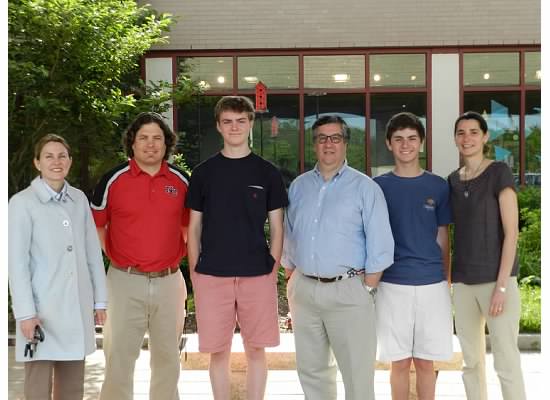PESTICIDE-FREE NEW CANAAN
|
Home Are Pesticides Safe? Why Go Pesticide-Free? How to Maintain Pesticide-Free Lawns and Gardens Resources: Articles, Land Care Professionals, Links Hall of Fame Pesticide Notification Registry New Canaan High School Gets New Research Fellowship From: Pesticide-Free New Canaan This summer, New Canaan High School students will hit the streets and waterways as research fellows in the school’s newly established Pesticide Educational Research Fellowship (PERF). Working together with CT DEEP and the Harborwatch program of Earthplace in Westport, student fellows will be collecting samples to generate baseline data on New Canaan’s surface water, taking door-to-door surveys, and learning about the public health and ecological dangers caused by nonpoint sources of pollution like chemical lawn pesticides and synthetic fertilizers. |
 |
The program was developed by Heather Lauver and Micaela Porta, Co-founders of Pesticide-Free New Canaan, a nonprofit initiative that seeks to limit our exposure to toxic lawn chemicals by transitioning consumers to pesticide-free land care. “As science educators, we strive to find real life, relevant issues that allow students to define problems, collect and analyze data, draw conclusions, communicate findings, and develop solutions to those problems,” says Christian Dockum, Chair of the high school’s Science Department. “PERF is a confluence of these process skills at the local level. The NCHS Science Department is very excited to have the opportunity to collaborate with Pesticide Free New Canaan in order to increase the awareness of issues associated with chemical pesticides and fertilizers.”
Pesticide-Free New Canaan raises awareness and advocates organic lawn care: “To take helpful action, the community needs accurate information – hence the fellowship,” says Lauver, who holds a Master’s in Public Health from Yale and is the President and CSO of HealthSpec, a consulting firm specializing in health and ecology. “We know from research that these chemicals aren’t good for our health or the environment, and sustainable problem solving dictates that we take a balanced, scientific approach.” Chemical lawn applications are prevalent in the suburbs, but CT DEEP, the agency charged with monitoring pesticide levels throughout the state, is so underfunded that oversight has fallen to about 3 statewide monitoring agents. “This is where we come in,” explains Lauver, who designed the fellowship as a way of providing a necessary, ongoing service to the town while harnessing the energy and enthusiasm of New Canaan’s brightest students.
“I commend Heather and Micaela for setting this up,” says First Selectman Rob Mallozzi. “This fellowship will provide the perfect opportunity to get our High School students engaged in an issue important to our local community and the ecosystem at large.”
Working collaboratively with Harborwatch and CT DEEP scores a win for all sides. Harborwatch, which monitors point sources of water pollution in Westport, will receive valuable data on Five-Mile River conditions in upstream New Canaan, allowing them to test for both biological and chemical contaminants that harm human and aquatic life. CT DEEP will receive samples from New Canaan that Lauver and Porta will deliver within hours of collection to their lab in New Haven for pesticide analysis. Results of those analyses will be input by CT DEEP into the State’s database for tracking over time, helping to determine the extent of the problem in New Canaan.
“We have a lot of work ahead of us,” says Porta, “but we’re thrilled to be working with our partners at Inlands/Wetlands, the Conservation Commission, CT DEEP (through their “Teach Out” program) and the New Canaan Nature Center to do this important work for New Canaan. Without them, and without the generous support of grantors like the New Canaan Community Foundation, the St. Mark’s Outreach Commission, and Patagonia of Westport, this wouldn’t be getting off the ground.”